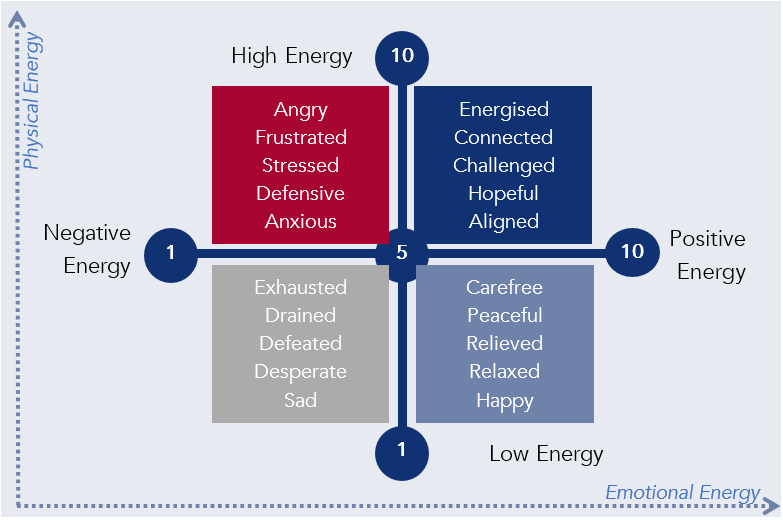Organisations are made up of people and, as such, organisational improvement cannot be dissociated from the individual improvement of each employee. Most of the workforce, regardless of their role, handle increasing workloads and additional working hours, which inevitably leads to physical, mental, and emotional fatigue. This fatigue in turn reduces involvement, affects the organisation’s culture, and contributes to higher employee turnover. How can organisations improve if their main assets are not in a flow state?
The common trend towards increasing working hours in response to increased workload is not a winning strategy for either the people or the organisation, as time is a finite resource and as such will rarely satisfy every need. Although it may be possible to do the work, your employees will be giving up moments of rest, which are essential for good performance in the next challenge.
The same is not true for Energy. Energy, by definition, is the “capacity that a body, a substance or physical system have to perform work” having four main sources: the body, mind, emotions, and spirit. There are several external stimuli that can contribute to an energy deficit, many of which are unpredictable. However, each of these energies can be expanded and renewed if routines and recovery behaviours are followed. These routines and behaviours make up the KAIZEN™ Energy model, which presupposes correct management of one’s energy, ensuring that there are moments of high focus and performance together with rest and recovery.

How do you Manage your Personal Energy?
Ideal management of personal energy allows you to release time for other tasks besides work, increase performance and thus reach the flow state: a state of total involvement, focus and energy in a certain activity.
This management implies a balance between energy consumption and energy recovery. The balance is possible when one acquires the ability to transition between states of focus and total involvement – sprint – and absolute states of abstraction and rest. Moments of stress and focus foster the development of new capacities through challenges and difficulty. The moments of rest, on the other hand, allow learning that occurs during moments of focus to be absorbed and retained.
In practice, during the workday, several moments of rest should be taken, which, although short, need to be of complete abstraction from work. Only this way the body and mind will be able to recover to deliver efficiency and quality in moments of focus.
100% Involved, Physically and Spiritually
There is no sane body without a healthy mind. Thus, the cycle of individual improvement can only be achieved through the combination of several components, including physical exercise, a balanced diet, nutrition, quality rest, and sleep. By ensuring these positive physical behaviours, it is possible to absorb a greater amount of energy, essential to feed sprint moments.
The spiritual dimension cannot be neglected, and to obtain energy from this source it is necessary to have clear and focused life goals, missions, management of external and internal factors, focus, concentration, and creativity. The spiritual component of energy is that which contributes to the motivation and commitment of each one with the activities being performed.
According to KAIZEN™ Energy, it is necessary to have not only the necessary quantity but also the right quality of energy. Adopting behaviours that generate positive emotions, such as expressing gratitude or starting interactions with a positive remark, will allow you to generate emotional energy, increasing the quality of available energy. This will make it possible to complete tasks in less time and without too much effort.
Inner Game Development: Personal Diagnosis
The Inner Game Development challenges each person to review their personal practices, starting with life and mission goals, values, ambitions, beliefs, barriers, up to the way we feed ourselves and promote physical and mental energy. This is the moment of diagnosis that allows us to define the starting point and the goals to achieve in our journey towards individual improvement.
After the diagnosis is carried out and the current state is known, to initiate the change, it is necessary to break current paradigms and accept new guidelines:
- Energy management, not time management
- Look for stress and accept it as an opportunity to grow
- Face challenges as sprints series, not as a marathon
- Rest time is key, it is not time wasted
- Values and goals are the drivers of performance improvement
- Involvement is the key for full personal energy management
Having defined the starting point, and with the new paradigms in mind, the next step is to map out the mission, the energy dimensions, the beliefs (new and old) and your personal action plan. This map, in a schematic or visual format, should answer questions such as “What are my life goals for the next three to five years?”, “How to invest energy throughout the day?” or “What are your major skills and weaknesses?”.
14 minutes a day to review the mapping is the necessary time to ensure focus. During this time, the following requirements must be met:
- Remember the mission and align your energy with goals.
- Define the personal and professional priorities for the day.
- Review the new behaviours to adopt and define a clear path to incorporate them into your daily routine.
This plan should be reviewed, ideally, every six months. For each review, it is important to “review the mission” and “reorganise it” if necessary, as is the case with the strategy review of goals in an organisation.
Personal energy management brings physical and emotional benefits to individuals and to those surrounding them. Organisations also benefit from having motivated and focused employees, as they will be able to create more value and contribute to a healthy and efficient culture. Thus, managing one’s individual energy becomes not only a personal but also a business priority. Investment in people as an important asset will dictate the results that organisations are capable of achieving.
#culture and organisation
See more on Culture & Organisation
Find out more about improving this business area
